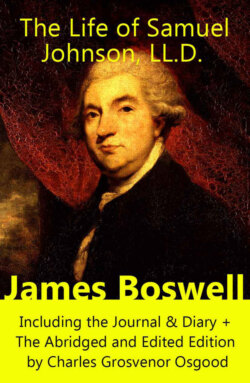Читать книгу The Life of Samuel Johnson, LL.D. - James Boswell - Страница 29
На сайте Литреса книга снята с продажи.
ОглавлениеHe now removed to London with Mrs. Johnson; but her daughter, who had lived with them at Edial, was left with her relations in the country[320]. His lodgings were for some time in Woodstock-street, near Hanover-square, and afterwards in Castle-street, near Cavendish-square. As there is something pleasingly interesting, to many, in tracing so great a man through all his different habitations, I shall, before this work is concluded, present my readers with an exact list of his lodgings and houses, in order of time, which, in placid condescension to my respectful curiosity, he one evening dictated to me[321], but without specifying how long he lived at each. In the progress of his life I shall have occasion to mention some of them as connected with particular incidents, or with the writing of particular parts of his works. To some, this minute attention may appear trifling; but when we consider the punctilious exactness with which the different houses in which Milton resided have been traced by the writers of his life, a similar enthusiasm may be pardoned in the biographer of Johnson.
[Page 111: The Gentleman’s Magazine. Ætat 28.]
His tragedy being by this time, as he thought, completely finished and fit for the stage, he was very desirous that it should be brought forward. Mr. Peter Garrick told me, that Johnson and he went together to the Fountain tavern, and read it over, and that he afterwards solicited Mr. Fleetwood, the patentee of Drury-lane theatre, to have it acted at his house; but Mr. Fleetwood would not accept it, probably because it was not patronized by some man of high rank[322]; and it was not acted till 1749, when his friend David Garrick was manager of that theatre.
The Gentleman’s Magazine, begun and carried on by Mr. Edward Cave, under the name of SYLVANUS URBAN[323], had attracted the notice and esteem of Johnson, in an eminent degree, before he came to London as an adventurer in literature. He told me, that when he first saw St. John’s Gate, the place where that deservedly popular miscellany[324] was originally printed, he ‘beheld it with reverence[325].’ I suppose, indeed, that every young authour has had the same kind of feeling for the magazine or periodical publication which has first entertained him, and in which he has first had an opportunity to see himself in print, without the risk of exposing his name. I myself recollect such impressions from ‘The Scots Magazine,’ which was begun at Edinburgh in the year 1739, and has been ever conducted with judgement, accuracy, and propriety. I yet cannot help thinking of it with an affectionate regard. Johnson has dignified the Gentleman’s Magazine, by the importance with which he invests the life of Cave; but he has given it still greater lustre by the various admirable Essays which he wrote for it.
[Page 112: A list of Johnson’s writings. A.D. 1738.]
Though Johnson was often solicited by his friends to make a complete list of his writings, and talked of doing it, I believe with a serious intention that they should all be collected on his own account, he put it off from year to year, and at last died without having done it perfectly. I have one in his own handwriting, which contains a certain number[326]; I indeed doubt if he could have remembered every one of them, as they were so numerous, so various, and scattered in such a multiplicity of unconnected publications; nay, several of them published under the names of other persons, to whom he liberally contributed from the abundance of his mind. We must, therefore, be content to discover them, partly from occasional information given by him to his friends, and partly from internal evidence[327].
[Page 113: Edward Cave. Ætat 29.]
His first performance in the Gentleman’s Magazine, which for many years was his principal source for employment and support, was a copy of Latin verses, in March 1738, addressed to the editor in so happy a style of compliment, that Cave must have been destitute both of taste and sensibility had he not felt himself highly gratified[328].
[Page 114: ‘Ad Urbanum.’ A.D. 1738.]
‘Ad URBANUM’.
URBANE[329], nullis fesse laboribus, URBANE, nullis victe calumniis[330], Cui fronte sertum in eruditâ Perpetuò viret et virebit;
Quid moliatur gens imilantium,
Quid et minetur, solicitus parùm,
Vacare solis perge Musis,
Juxta animo studiisque felix.
Linguæ procacis plumbea spicula,
Fidens, superbo frange silentio;
Victrix per obstantes catervas
Sedulitas animosa tendet.
Intende nervos, fortis, inanibus
Risurus olim nisibus æmuli;
Intende jam nervos, habebis
Participes operæ Camoenas.
Non ulla Musis pagina gratior,
Quam quæ severis ludicra jungere
Novit, fatigatamque nugis
Utilibus recreare mentem.
Texente Nymphis serta Lycoride,
Rosæ ruborem sic viola adjuvat
Immista, sic Iris refulget
Æthereis variata fucis[331].’
